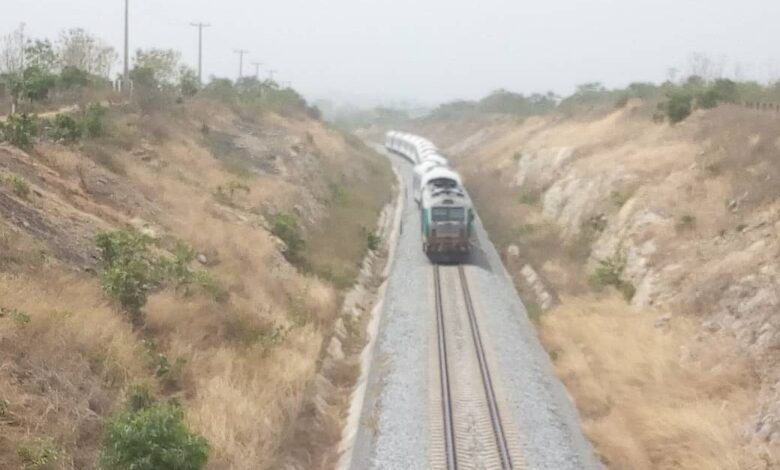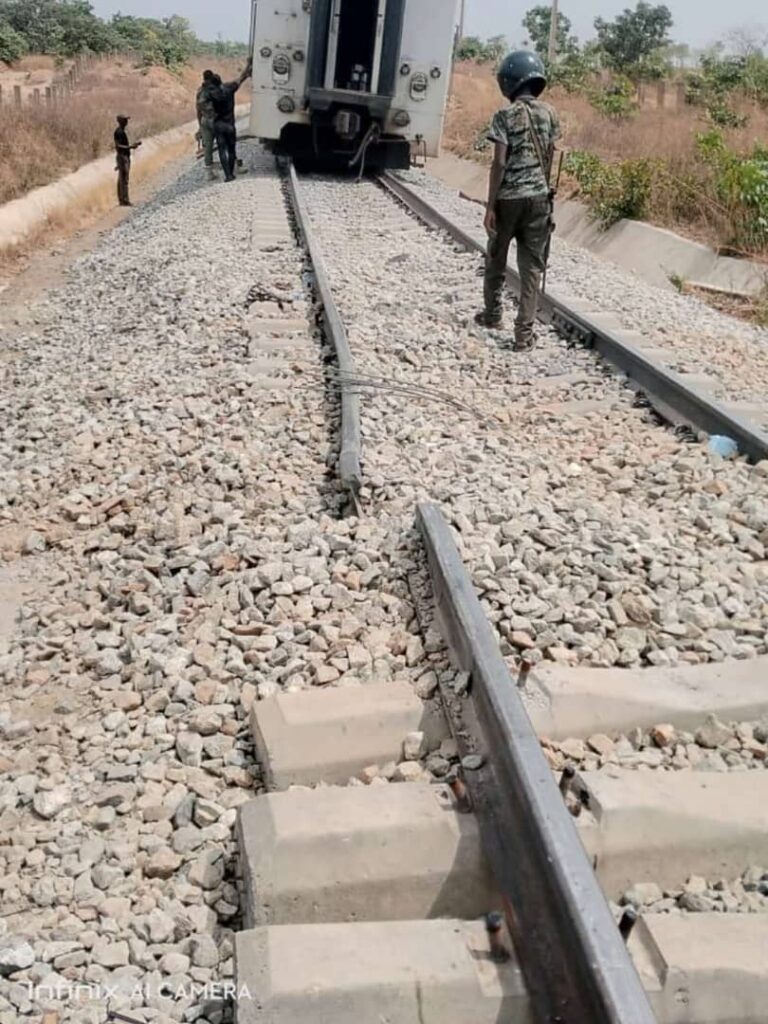Fear Of Terrorists Slows Kaduna Rail Track Repairs, Demoralises Staff
About a kilometre of railway track was destroyed when terrorists attacked a train on March 28, 2022, between Rijana and Dutse in Northwest Nigeria.

Repairs at the site where terrorists bombed an Abuja-Kaduna bound train on March 28, 2022, are slow due to fears that there may be another attack at any time, a source at the railway station tells HumAngle. The incident, which took place close to Kaduna, claimed lives, left some injured, and made others captives in the hands of the terror gang.
One employee, Musa (not real name), revealed that a cleaner on the train was one of the first persons killed during the attack and several staff members were also kidnapped.
“I managed to escape because I hid in the toilet along with several passengers until the kidnappers had gone,” another worker said.
Unusual day for employees
It was past 8:30 p.m. [WAT] on that fateful day and the train should have arrived by then, Musa continued.
“Anytime around then when the train does not arrive, what we do is to call the next station to give us feedback,” one official said. Where is the train at the moment? That was when they realised that it had not reached Dutse and yet had left Rijana.
“That was when it was attacked.”
The control office in Dutse later called with the scary news that the train had been attacked. Then they called the chief of security in Rigasa to send men to the scene. But because of the need to follow a chain of command in getting personnel to the spot, it was about an hour before the support security team reached the crime scene. By then the worst had already happened.
At that time, there were many people, some relatives, waiting to receive their family members. Frantic phone calls were made, but there was no network. Some, however, succeeded, still, their calls were not answered. They soon learnt that the train was under attack too and that was how the information spread.
The train has cleaners, carriage persons who also handle the train lights, security personnel, and those who manage food stands.
“I know of four or five of our staff who were victims, with one killed. She was a cleaner, Loretta. She was even sick and coincidentally that was the day she resumed work. We heard that she was the first person they killed. She has already been buried.
“There was another one who was about to get married and was kidnapped,” Musa added.
Fear
The incident, which put up to 398 passengers at risk, has left employees in a state of fear, including the engineers responsible for fixing the train tracks.
“We have engineering staff in Kaduna and Abuja. When they come in the morning, they communicate with each other and meet at the tracks. Then join hands to do the work and are usually done by four or five p.m.,” Musa explained.
“They need to fix the tracks destroyed, and more than a hundred slippers have been destroyed. They have been going there to repair it with the help of a crane.”
But he pointed out that the engineers are unable to go to the site early. They leave their stations around 9 or 10 a.m. and then get to the spot by 11 a.m., which is quite late.
“They go there with our security. There are also soldiers, but the soldiers always tell them that they have to leave by 4 p.m. because they need to go back to secure the main road.”
He added that on Wednesday, March 30, the railway security saw men they suspected to be terrorists from a distance and alerted the rest of the security teams.
“Staff grumble because their mind is not at rest even with the security there. Sometimes they hear gunshots,” Musa said.
Train security personnel’s perspective
A security officer responsible for protecting the engineers while they work confirms this state of fear among staff.
“There are security threats,” Kalat (not real name) began. “Even this morning [Monday, April 4], a Fulani man who gives me information told me, over the phone, how the area is. He said, as of Sunday [April 3], they [terrorists] kidnapped some people along the Jere area. They succeeded even in the daytime. He had to move his cows from the village, which is close to Jere, to Abuja.”


When HumAngle contacted ASP Mohammad Jalige, spokesperson of the Kaduna State Police Command, he said he had been informed and had put a call to the area commander. He promised to reach out when he got a response.
Kalat added that fixing the rail track has not been fast because the damage is much and, although he is not an expert, the work appears to be done manually.
“They are also doing it with fear because they can be attacked anytime. One of the days while they worked, information came that the bandits were coming, so they had to leave the site immediately.”
The officer went on to shed light on the recent attack.
“Till today, there are some coaches that you can’t enter and stay for five minutes because of the bloodstains. The damage on the rail is too much, more than a kilometre. Based on my observation, the level of damage is not as a result of the bomb blast but by the force of the train after the explosion as it forced its way.”
Kalat spotted blood stains on the route the kidnappers took their captives. “That place is in the midst of the valley. If anything is happening there, you won’t know. The only thing that will alert people is the sound of a blast. If a train is passing through you cannot see its top,” he said.
“Even if you succeed in escaping, you can only lie down somewhere because you can’t climb up. If they [terrorists] finish the operation and you are alive, thank God. They have studied the place very well. From my experience, where they attacked is the same point they blasted the first time, kilometre 137.5. It’s between Rijana and Dutse.”
The blast was under SP4, which is the first coach after where the locomotive driver operates, Kalat explains. So, the terrorists targeted the coach and not the engine because, from their first experience trying to bomb the train, they had aimed at the engine and failed. They learned it cannot be blasted because it is made of iron and bulletproof.
Also, “in the attack, so far from my observation, they didn’t focus their attention on the economy coaches but first class. Those affected by the kidnapping were either in SP17, Sp20, SP12, SPA5, or SPA2.
“The economy class affected was SP17 and, from my experience, the shots that affected SP17 were from a distance. Others were close range.”
So far, there are only three patients in the Intensive Care Unit (ICU) at the 44 Nigerian Army Reference Hospital Kaduna, where those affected by the attack were rushed to, HumAngle gathered. Others have since been discharged.
Support Our Journalism
There are millions of ordinary people affected by conflict in Africa whose stories are missing in the mainstream media. HumAngle is determined to tell those challenging and under-reported stories, hoping that the people impacted by these conflicts will find the safety and security they deserve.
To ensure that we continue to provide public service coverage, we have a small favour to ask you. We want you to be part of our journalistic endeavour by contributing a token to us.
Your donation will further promote a robust, free, and independent media.
Donate HereStay Closer To The Stories That Matter




